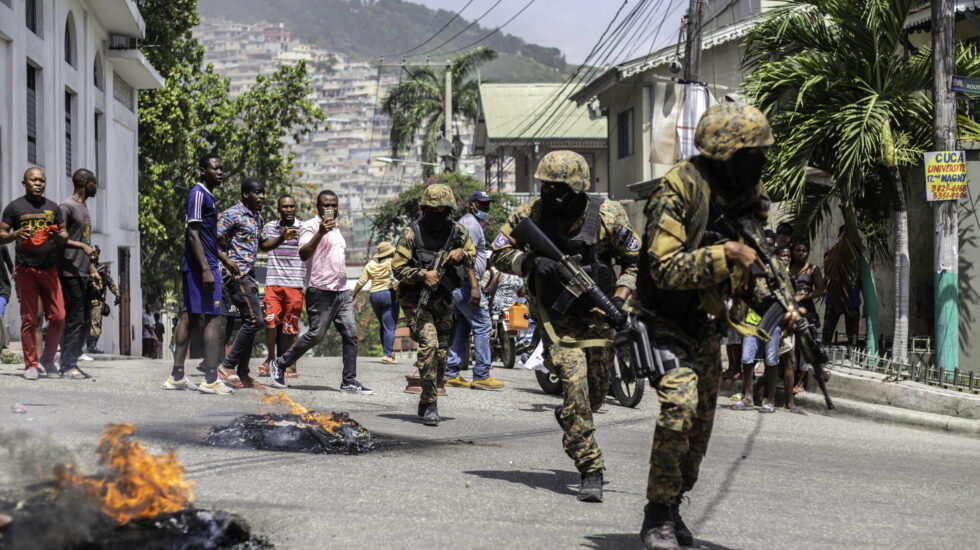The Wednesday assassination of Haitian president Jovenel Moïse has triggered a manhunt with international implications that has thus far captured two Americans and at least 15 former members of Colombia’s army. Violence has broken out in Port-au-Prince, the nation’s capital, as citizens reckon with the brutal home invasion that also sent Moïse’s widow to the hospital with gunshot wounds.
“Political intrigue, gang violence, general lawlessness, a public health crisis driven by the pandemic and difficulties delivering essential international aid have conspired to create the worst crisis in Haiti in years,” reports The New York Times.
On Thursday, authorities blocked roads and engaged in a firefight with “commandos” suspected of carrying out the assassination. The Associated Press describes the chaotic details:
In Port-au-Prince, witnesses said a crowd discovered two suspects hiding in bushes, and some people grabbed the men by their shirts and pants, pushed them and occasionally slapped them. An Associated Press journalist saw officers put the pair in the back of a pickup and drive away as the crowd ran after them to a police station.
“They killed the president! Give them to us! We’re going to burn them,” people chanted outside Thursday.
The crowd later set fire to several abandoned cars riddled with bullet holes that they believed belonged to the suspects. The cars didn’t have license plates, and inside one was an empty box of bullets and some water.
More from The New York Times:
More than a dozen of the suspects — some with physical injuries — were paraded before the cameras at a late-night news conference on Thursday. Several suspects were killed in clashes with the police, and at least eight other suspects are on the run, the authorities said.
“We are pursuing them,” said Haiti’s police chief, Léon Charles, before a phalanx of politicians and police officers.
Eleven men in full military gear broke into Taiwan’s embassy in Haiti on Thursday morning. They were eventually captured and described as “mercenaries” by Haitian police. In a topsy-turvy week, it’s unclear if they are among the suspects detained in association with the assassination.
Indeed, it is still unclear who planned the attack. “Foreigners came to our country to kill the president,” said interim Prime Minister Claude Joseph.
Gangs might also be involved. The Wall Street Journal reports, “one of Haiti’s most powerful gang leaders, Jimmy Cherizier, known as “Barbecue,” recorded a video last week in which he called for Mr. Moïse to quit, as gang members, their faces hidden by balaclavas, waved machetes in the air.”
A leading Haitian businessman said there was a long list of suspects. “This is like an Agatha Christie novel,” said the businessman, according to The Journal.
Haiti’s government is infamously plagued by corruption and incompetence. There have been six prime ministers in the last four years. Moïse dissolved parliament in January 2020 and has since ruled by undemocratic decree; widespread protests had called for his resignation.
His unpopularity has led to speculation that his murderers had support from government officials. According to the AP, “many [Haitians] wondered how the sophisticated attackers described by police could penetrate Moïse’s home, security detail and panic room and escape unharmed but then be caught without planning a successful getaway.”
From The Washington Post:
Meanwhile, regional neighbors are calling for international intervention to prevent further unrest in a country already unsettled by months of street protests against Moïse’s extended rule. Armed gangs with unclear allegiances have seized control of growing portions of the country, terrorizing the population with kidnappings, rapes and killings.
The country – the poorest in the Western Hemisphere – now has two men claiming to be prime minister. Joseph had served in an interim capacity but Moïse had recently appointed another man, Ariel Henry, to be sworn into office this week.
Still, Joseph has maintained control of the state’s apparatus. More from The Wall Street Journal:
Following a cabinet meeting, Mr. Joseph assumed control of the government and declared a state of siege, which restricts freedom of movement, puts the military in charge of security, replaces civilian courts with military tribunals, and restricts media information, Mr. Joseph said in a televised address to the nation.
The U.S. State Department said they’d continue to work with Joseph since he was the incumbent, but they’ve also been in touch with Henry. The two are currently engaged in a power struggle to manage a country that has a deficit of elected officials. Many government posts remain unfilled.
The New York Times concludes:
The dueling claims created a volatile political crisis that left constitutional experts confused and diplomats worried about a broad societal collapse that could ignite violence or prompt Haitians to flee the country en masse, as they have after natural disasters, coups or other periods of deep instability.



